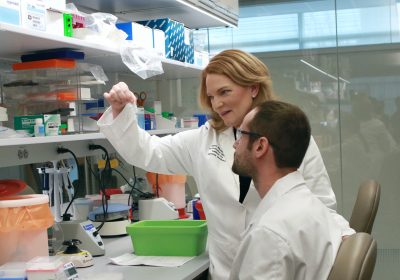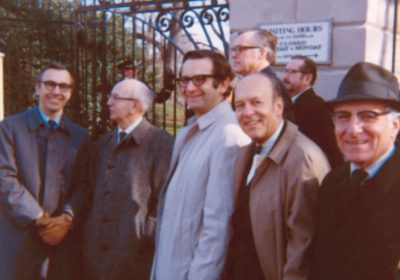Dr. Robert A. Winn: Making Inroads Against Cancer Disparities
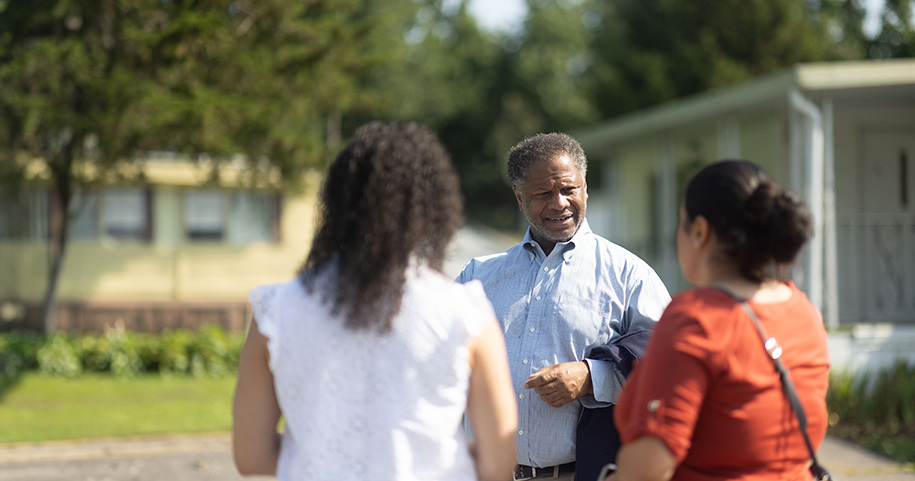
Early in his career, Dr. Winn recognized that improving care for all cancer patients means bringing translational research into at-risk rural and urban communities. He has been a driving force in studying the factors leading to cancer disparities and implementing solutions for equitable outcomes.
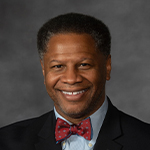 Robert A. Winn, MD, grew up in a working-class neighborhood in Buffalo, New York. “I had no interest in science or pursuing a career in medicine or health. No one in my family had even gone to college. We were a typical blue-collar family that worked at the local steel and automotive plants,” he said. “My highest aspiration when I was growing up was to be the youngest foreman at the General Motors plant.”
Robert A. Winn, MD, grew up in a working-class neighborhood in Buffalo, New York. “I had no interest in science or pursuing a career in medicine or health. No one in my family had even gone to college. We were a typical blue-collar family that worked at the local steel and automotive plants,” he said. “My highest aspiration when I was growing up was to be the youngest foreman at the General Motors plant.”
Today, Dr. Winn is the director of the Virginia Commonwealth University (VCU) Massey Comprehensive Cancer Center in Richmond and a leading figure in cancer disparities research. He credits his professional success to mentors and teachers who saw something in him that he didn’t see in himself. “I am a testament and a result of outreach by individuals and through community programs that had a major positive impact on my life,” Dr. Winn said.
He credits Head Start, a federally funded program for low-income families that prepares young children for success in school. “Not only did being in this program give me a heads-up on learning how to read, but it also made reading important for my whole family,” he said. Dr. Winn’s father had been a sharecropper when he moved to western New York. Dr. Winn recalled his father taking adult reading classes and eventually becoming an avid daily reader of the New York Times.
The young Winn’s first significant mentors were two priests at the University of Notre Dame in South Bend, Indiana, which he entered as an undergraduate in 1983. The priests oversaw the university’s pre-professional program, and Winn planned to major in engineering. “Where I came from, the natural order of things was getting a good-paying job at a factory. I thought I wanted to get a job at General Motors after college, and the best route for that seemed to be engineering,” Dr. Winn said. In his sophomore year, Winn heeded the priests’ advice and switched to the pre-medicine track.
“The classes were difficult at first but then doable,” he recalled. “I bonded with classmates in the same major, and along the way, it became clear that I enjoyed the sciences. I saw that Father Robert Austgen and Father Joseph Walter were correct and began to believe in myself. I also had a family that was very supportive of my education.”
As a pre-med student, Winn took advantage of an opportunity to work in a laboratory at Cornell University in Ithaca, New York, as part of a summer research fellowship program for minority students interested in science. There, he had his first laboratory experience, working on a bone cancer project. During another summer break from college, he volunteered at what would become the Roswell Park Comprehensive Cancer Center close to home in Buffalo. Doctors there gave him an opportunity to work in a histology laboratory, piquing his interest in a career in medicine.
In 1987, Winn became the first person in his family to graduate from college. His college experiences had shown him that he could use science to benefit people. “Then I was off and running—applying to medical school,” he said.
A Foundation in Pulmonary Medicine
Winn entered medical school at the University of Michigan in Ann Arbor in 1987. His genetics teacher was Francis S. Collins, MD, PhD, who later became the director of the National Institutes of Health in Bethesda, Maryland. Dr. Winn credits Dr. Collins with igniting his excitement for research and discovery science that can improve people’s lives. “His passion and enthusiasm really rubbed off on me,” Dr. Winn recalled. Winn felt in his element in medical school, which had a robust inclusivity program. His classmates were from varied backgrounds and cultures. “Medical school was tough, but I formed long-lasting friendships,” he said. “I remember on graduation day, we all felt so proud to graduate from this amazing institution. There was a tremendous sense of camaraderie. I had found my tribe.”
Following his medical school graduation in 1993, Dr. Winn went to Rush-Presbyterian-St. Luke’s Medical Center in Chicago for an internship followed by a residency program. There, he began his career in pulmonary medicine, surrounded by some of the best pulmonologists in the field. He absorbed the work ethic and bedside manner of his mentors, including the chair of the Department of Medicine, Stuart Levin, MD. Dr. Winn calls the doctors there “consummate clinicians who drove me to care for patients with lung diseases.”
I am a testament and a result of outreach by individuals and through community programs that had a major positive impact on my life.”
–Robert A. Winn, MD
Continuing his medical training, in 1997, Dr. Winn was recruited to a fellowship in pulmonary medicine and critical care at the University of Colorado Health Sciences Center in Denver. “That was like being on the Chicago Bulls basketball team and not having just a single Michael Jordan on your team, but 25 Michael Jordans!” he said. At the time, the hospital had one of the best and largest pulmonary medicine teams in the U.S., including pulmonologists Thomas L. Petty, MD, and York E. Miller, MD, and oncologists Paul Bunn, MD, and Harry Drabkin, MD, who pulled Dr. Winn into research. “Here, I had tremendous growth, and [it was] where I decided that I wanted to be a physician-scientist focused on lung cancer,” he said.
Dr. Winn began molecular and cellular biology studies of the signaling pathways that are dysregulated in lung cancer. By 1998, he was running his own cancer biology laboratory. He focused on the Wnt signaling pathway, which is critical for normal embryonic development. At the time, researchers were teasing out how mutations in components of this pathway can lead to various types of cancers, including lung cancer. In a study published in 2002, Dr. Winn identified a component of the Wnt pathway, gamma-catenin, as a novel tumor suppressor in a subset of human lung cancer.
Dr. Winn credits researchers Lynn E. Heasley, PhD, and Raphael Nemenoff, PhD, both at the University of Colorado, for shaping him into a true scientist. Dr. Winn also expanded his responsibilities, taking on the dean of admissions role for the medical school at the University of Colorado in 2008.
Introducing the Community to Bench Model
From the time Dr. Winn was a fellow in pulmonology, he was struck by the disparities he observed in lung cancer: Black men had a higher incidence of lung cancer compared with other racial and ethnic groups, as well as a higher death rate from the disease. Lung cancer was one of the leading causes of death among Black people and in rural areas of the U.S.
In 2013, he moved to Chicago to become the director of the lung cancer program and a professor at the University of Illinois Hospital & Health Sciences System (UI Health). “This chapter of my career—bringing translational, benchtop science to the community and having the community inform the science we were doing—was the genesis of my career in health equity,” said Dr. Winn.
Also in 2013, he was appointed to oversee a network of 13 community health centers affiliated with UI Health in the Chicago area. His vision was to bring the best of academic research to the populations served by these health centers. Under his leadership, the hospital went from receiving zero grants to serve these communities to more than 100, covering everything from understanding how to deal with opioid issues and asthma to addressing the effectiveness of lung cancer screenings.
In 2016, he co-authored a published statement from the Society of Behavioral Medicine endorsing the U.S. Preventive Services Task Force’s recommendation of chest imaging screening for certain high-risk populations to reduce lung cancer mortality and encouraging health care providers to include treatment to reduce tobacco dependence as a component of lung cancer screening. The publication also provided a plan to identify barriers that may prevent individuals at high risk of lung cancer from receiving screening.
“It was amazing to be doing research with community health in mind and then using the results to benefit those at-risk communities,” Dr. Winn said. Academic research did not just trickle down and benefit communities without thoughtful implementation by clinical leaders, he observed.
Starting in 2013, when he became the associate vice chancellor of health affairs and community-based practice at the University of Illinois, he started using the term “community to bench” to describe an inclusive community-centered model of patient care.
“The big turning point for me was to see that there was a community in front of me with a host of information and to say, ‘How do we embed basic and translational research into these federally qualified community health centers?’” Dr. Winn recalled.
This was the basis for the model of using quality data from community health centers to drive research within these centers, with the goal of improving care in the community while also informing translational science, clinical trials, and care. Dr. Winn has pursued this approach ever since, understanding and finding ways to break down barriers to its success.
For example, many populations are hesitant to engage with academic clinicians, and historically, clinicians have not reached out to engage all populations. But as the director of the University of Illinois Cancer Center from 2015 to 2019, Dr. Winn began to bridge that gap by putting the needs of the community at the center of cancer research and care.
Dr. Winn established frameworks and allocated resources to make the connection between the DNA of individuals and what he called their ZNA, or ZIP code and neighborhood of association. “My studying the impact of an individual’s ZNA, or neighborhood, on their DNA evolved from my thinking about the community-to-lab bench model. I wanted to go further, to understand how a neighborhood can drive poorer outcomes for its inhabitants and how this ZNA influenced their genetics,” he explained.
A recent study by Dr. Winn and his colleagues examined external and biological factors to explain why, despite lower rates of smoking, Black men in Chicago have a higher incidence of lung cancer than white men there. Analyzing lung tumor samples and the level of violent crimes in neighborhoods, researchers found initial evidence that exposure to violent crime in one’s neighborhood could influence tumor biology, suggesting that lung cancer screening in neighborhoods of high social stresses, including high crime rates, may help to reduce racial disparities in lung cancer.
“We are just beginning to scratch the surface of this type of research that looks at multiple, complex external factors and how these affect our biology and health outcomes. It is really exciting work,” he explained.
A Selfless Mentor
Throughout his career, Dr. Winn has mentored a large number of clinicians and scientists, many of whom now conduct their own community-minded research.
“Dr. Winn brings his full self to his work and his lived experiences, and he encourages emerging researchers to bring their full and authentic selves to the work,” said Karriem Watson, DHSc, who was a postdoctoral fellow under Dr. Winn’s direction at the University of Illinois and is now the chief engagement officer of the All of Us Research Program at the National Institutes of Health (NIH). “He is one of the most innovative, passionate, centered scholars, whose intellect and scientific brilliance—and humbleness—is rooted in an unapologetic way to put the community first in all we do.” Dr. Watson’s role with All of Us is to engage with people across the U.S. who have traditionally been left out of medical research. “Being under Dr. Winn’s leadership and mentorship, you not only become a better scientist; you become a better person,” he added.
Curtis J. Henry, PhD, is the deputy associate director of diversity, equity, inclusion, and access for the University of Colorado Cancer Center and an associate professor of immunology and microbiology at the University of Colorado Anschutz Medical Campus in Aurora. He completed his postdoctoral fellowship under the guidance of James DeGregori, PhD, and Dr. Winn was one of his mentors during this time. “From our first encounter, Dr. Winn has been an ally and friend at each step of my academic journey,” Dr. Henry said. “He was instrumental in helping me secure my first NIH funding as a postdoctoral fellow and has provided me with invaluable advice. Whenever I need professional or personal advice from Dr. Winn, he has always been there for me.”
Dr. Winn made history as the first African American to lead an NCI-designated cancer center when he was named to head VCU Massey Comprehensive Cancer Center in 2019. “That in itself deserves the highest accolade and speaks volumes about his passion to help everyone, which is the fuel that has driven him to this level of success,” said Dr. Henry. “If I can have a similar or greater reach in the biomedical sciences, it will be due in large part to Dr. Winn being an inspiration to me and based on his willingness to share nuggets of wisdom along his journey.”
Paying It Forward Through the AACR
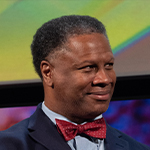
Robert A. Winn, MD, first met Margaret Foti, PhD, MD (hc), the CEO of the American Association for Cancer Research (AACR), at an AACR Annual Meeting when he was a junior faculty member. Inspired by the meeting, he has been active in the AACR ever since.
Dr. Winn was on the Steering Committee for the first issue of the AACR Cancer Disparities Progress Report, published in 2020. He was a co-chair of the committee for the 2022 edition and chaired the committee for the 2024 issue. The biennial report maps out the negative effects that cancer has on ethnic and racial minorities and other underserved populations in the U.S., highlights progress made against these disparities, and offers recommendations for more equitable health care. The 2024 report detailed progress made in just four years since the first report by capturing the dynamics and gaps in cancer prevention and care of rural and urban underserved communities.
In 2023, Dr. Winn was named a Fellow of the AACR Academy for his contributions to lung cancer research, cancer and health disparities, and community-based health care. These contributions include his work characterizing the molecular mechanisms that drive cellular proliferation and the role of senescence in lung cancer, and his dedicated efforts to champion health equity and access to care among underserved, high-risk cancer populations.
He is currently co-chair of the Fellows of the AACR Academy Communications and Public Education Subcommittee. Over the years, Dr. Winn has also served on the AACR Science Policy and Government Affairs Committee; the AACR Aging and Cancer: Stress and Other Risk Factors Task Force; the AACR Trust in Science Task Force; and the AACR Lung Cancer Task Force.
“We live in an era of extraordinary scientific progress against cancer, and we must ensure that all populations and communities benefit from the advancements being made. Dr. Winn has been at the forefront of these efforts, dedicating himself to overcoming barriers to cancer health equity,” said Dr. Foti. “He played a major role in helping produce three editions of the AACR Cancer Disparities Progress Report and chaired the committee for the 2024 edition. Dr. Winn’s contributions to the AACR don’t stop there, however. He has served the AACR in many and varied ways, and I am grateful for his steady and generous support of our mission to save lives from cancer.”
Dr. Winn is also the president of the Association of American Cancer Institutes; the chair of the National Cancer Policy Forum of the National Academies of Sciences, Engineering, and Medicine; and a member of the Board of Directors for the American Cancer Society and LUNGevity Foundation.
In 2020, the Bristol Myers Squibb Foundation, in partnership with the AACR and VCU Massey Comprehensive Cancer Center, launched an initiative to increase representation of diverse populations in clinical trials and among cancer researchers. The Robert A. Winn Excellence in Clinical Trial Award Program accepts participants with a demonstrated commitment to increasing diversity in cancer research. Medical students and early-stage investigator physicians selected for the program will become clinical trial investigators engaged in advancing health equity through their research and mentoring. In turn, a more robust and diversified group of investigators is expected to increase representation of clinical trial participants from a variety of backgrounds.
“Having few people from rural and at-risk communities participate in clinical trials has been an ongoing struggle in academic programs,” said Dr. Winn. “So, we came up with this bold program to teach medical students and early career clinicians to address the concerns of these populations through training, that they would then take back to their institutions to implement.”
Related Posts
